
- Este evento já passou.
NeST LATAM and Global Thinkers Meeting
14 de janeiro de 2020 | 00:00 - 15 de janeiro de 2020 | 00:00

O BRICS Policy Center tem o prazer de convidá-l@ para as mesas-redondas do evento NeST LATAM and Global Thinkers Meeting. Para as duas mesas são esperados importantes debates públicos com especialistas no tema a fim de refletir sobre os obstáculos específicos da América Latina em implementar aspectos do SSTrC.
Os eventos ocorrerão entre os dias 14 e 15 de janeiro de 2020 no BRICS Policy Center, localizado à rua Dona Mariana, 63, Botafogo – Rio de Janeiro.
O evento será ministrado em inglês.
RSVP: bpc@bricspolicycenter.org
Public Roundtable #1 | Horário: 16:30h – 18:30h
“Institutional arrangements and regional governance: LATAM main obstacles and enabling aspects for an improved coordination of SSTrC”
South-South and trilateral cooperation (SSC and TrC) presents a constellation of approaches and concepts in the various countries of Latin America. Seeking to discuss the taxonomy and different practices and approaches in Brazil, Argentina and Mexico, we invite experts from these countries to share how official and unofficial narratives around SSC and TrC have changed over the years, reflecting about how to deal with different institutional arrangements.
Speakers:
Chair: Paulo Esteves (BPC)
Ayala Citlali (Instituto Mora)
André de Mello e Souza (IPEA)
Gladys Lechini (Universidad Nacional de Rosario)
Luara Lopes (Articulação Sul)
Geovana Zoccal (BPC)
Public Roundtable #2 | Horário: 15:30h-17:30h
“Thinking about LATAM internal processes: regional main lessons and instruments to design, monitoring and evaluating SSTrC projects and programs”
Considering the multiplicity of SSTrC in conceptual, practical and institutional terms, one of the main challenges faced is the development of monitoring and evaluation (M&E) processes and instruments. To discuss these challenges, we invite experts from Brazil, Argentina and Mexico to share what are the key lessons learned regarding SSTrC’s internal monitoring and evaluation processes in Latin America.
Speakers:
Chair: Camila Santos (BPC)
Alejandra Kern (Universidad Nacional de San Martin)
Aline Rizzo (IPEA)
Lara Weisstaub (Universidad Nacional de San Martin)
Luara Lopes (Articulação Sul)
Jorge Pérez-Pineda (Universidad Anáhuac)

